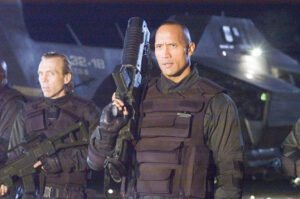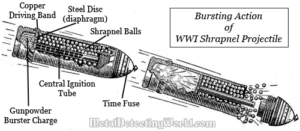You may be working on a TV or movie script or creating a video game. You may be writing a news report, sourcebook, article or novel. The chances are that sooner or later you will have to deal with weapon or military related topics. Using the wrong term can easily make your efforts worthless nonsense. Here are some common mistakes that can easily be avoided.


Magazines
One of the most common and prevalent mistakes is also one of the easiest to avoid. There are few ways that will as easily destroy your credibility or that of your character as this mistake. A “clip” is not a “magazine”. Despite common misuse “clip” is not an alternative term for “magazine”, they are separate and distinct things. A clip is a mechanical component that fits inside a magazine. To say they are the same is like claiming a rabbit is the same as a burrow or a sock the same as a foot! It is not “semantics”, it is just plain wrong! I have known at least one veteran soldier who would grind his teeth every time a journalist, screen writer or supposed “expert” gun writer made this mistake. Details that you may not appreciate may matter a lot to others. If you cannot get a basic detail like this right you might as well give up writing.
The quick rule of thumb is, if you want to use “clip” you should use “magazine”. Any time you want to use “clip” you have a 99% chance of getting it wrong, so don’t! For small arms clips are something of an anachronism and only found is some vintage weapons. Very few modern firearms require ammunition to be loaded into a clip. Rounds fit directly into the magazine. Futuristic weapons are very unlikely to use a clip. See here for more detailed explanations. If you take one thing away from this article, make it this and your writing will have improved considerably.


Shrapnel
Shrapnel is a term that needs to be treated with some caution. Any time you want to use “shrapnel” instead of “fragments” or “splinters”, there is a 95% chance of being wrong. Strictly speaking shrapnel comes from a shrapnel shell. Typically a shrapnel shell contains a mass of musket balls of around half an inch diameter. Unlike a shotgun shell or canister load, a shrapnel shell explosively ejects its contents in mid-air. Shrapnel shells were adopted in 1803, copied by other nations and saw a decline in use during the First World War, the large infantry formations that were the intended target becoming uncommon. Some later designs such as the AHEAD anti-aircraft round could be legitimately described as shrapnel. The term is actually seldom used in modern military technology publications. See here for a space warfare application of shrapnel.
Most of the time someone uses the term “shrapnel” they actually mean splinters or fragments. It could be argued shrapnel has become a generic term for such things but its more definite meaning can cause problems. I recently read a book where the author spoke of “ground strewn with jagged shrapnel”, which is a ludicrous oxymoron to the educated reader. A very nice example of the problem was in the BBC Musketeers series, where a character claims men have been wounded by shrapnel. Not only did she actually mean wooden splinters and stone fragments, but this constitutes an anachronism too.
Incidentally, true shrapnel munitions usually do not produce fragments too. The ejection charge is too weak to rupture the casing.
It is tempting to use specialized jargon to create the impression that you are knowledgeable. Not doing your research and using it wrongly can create the opposite effect.
Shrapnel is a term best reserved for character dialogue only. A good rule of thumb is “shrapnel” is within the casing of a munition while “fragments” are from the casing of a munition.
Shells, Shot and Grenades
A “shell” is a container. There are explosive shells, gas shells, incendiary shells, smoke shells, HEAT-shells and so on. Shotgun cartridges are also called shells. “Shot” are solid projectiles. The pellets from a shotgun are shot. Non-explosive armour-piercing rounds fired by tank and anti-tank guns are shot, not shells. A “grenade” is a munition either thrown by hand or by a low-velocity launcher. In some languages the equivalent word has a broader meaning, closer to that of shell. This use is creeping into English, via such uses as mistranslations of RPG. A German term for a mortar literally translates as “grenade-launcher”, but using this term in English causes confusion.
HEAT Warheads
Also known as “shaped-charge” or “hollow-charge”. The name is from the acronym “high-explosive anti-tank” and is not related to temperature. Several misconceptions about these warheads are related to temperature. One is that the jet the explosion produced melts its way through armour. In reality, the blast forces its way through the armour. There is insufficient time and heat to melt the armour. A related idea is that the penetrating jet is of molten metal. While the jet is very hot, it does not reach a sufficient temperature to melt the cone-liner, which is usually a high melting point metal such as copper or steel. The liner is formed into a hot, malleable solid that is forced through the armour.
Suppressor
You will find assertions that the term “silencer” is wrong and that the correct term is “suppressor” or “moderator”. This is a modern affection and is actually wrong. Maxim’s first designs were called “silencers” so the term is legitimate. Many people who claim this is wrong call magazines “clips”, which tells you all you really need to know about them! Suppressor and moderator are more fashionable terms in modern usage so are the terms more likely to be used by characters familiar with firearms or military hardware. What term a character uses will depend on their familiarity with such devices and their era. A cop in the 1920s or a modern civilian non-shooter is likely to claim a suspect had a silencer.
Graticule vs Reticule
This is an easy one to remember. A graticule has some form of graduations, a reticule does not.
Calibres
Weapon calibres are nominal, rather than accurate measurements. Two weapons of the same nominal calibre may use quite different rounds of ammunition. It is not advisable to round up calibres, nor convert them between imperial and metric. Don’t call a 7.92mm rifle 8mm. Don’t describe a Browning HMG as 12.7mm, nor a DShK as .50.
Revolver

In some older books “revolver”, is used as a generic term for a pistol or handgun. Characters will draw a revolver which in a later passage is identified as a Luger! You will also see revolvers treated as being distinct from pistols. This confusion is the result of “automatic” being dropped from “automatic pistol”. Revolvers are actually a subset of pistols or handguns, so calling them pistols is permissible.
I have seen a couple of books or movies where a character asks something like “How many bullets are in the chamber?” The only possible answers to this are “one” and “none”. This error comes from confusing a revolver's cylinder with a chamber. A revolver has a cylinder with a number of chambers in it. One round goes into each chamber. Typically there are six chambers. Small revolvers and large calibre designs may have fewer chambers. Small calibre revolvers or some more modern designs may have more. You can say that a revolver only has “two shots in its cylinder”. You cannot say it only has “two shots in its chamber”.
Revolvers have a gap between the barrel and the chamber. Therefore most revolvers cannot effectively use a suppressor/ silencer. There are exceptions to this but that stable of 70s cop shows, the detective special with a little Champaign cork-sized thing on the muzzle, is pure fantasy.
Trading Shots
If two units are “trading shots” they are shooting at each other. I would have thought that this did not have to be explained, but I recently read a book where several times artillery “trade salvos” and the shots are then described as being targeted against other units.
Incidentally, a weapon is not “the answer to…” another system unless it is a direct counter to it. The German Nebelwerfer was not the answer to the Soviet Stalin’s Organ, it was its equivalent.
Jargon
Like many institutions and cultures the military have their own jargon, some of which are effectively shibboleth. You should familiarize yourself with some of these before writing on the subject. For traditional reasons the British rifleman will call his bayonet “a sword”, no matter how short the blade. A private of a rifle regiment will be a “rifleman”, not a “trooper” incidentally. A more common tradition is the US military practice of calling caps and hats “covers”.
A tradition to note is that US marines do not refer to themselves as “soldiers”. One marine will never call another a soldier. I have even seen a marine chewing out kindergarten children on this when the children had sent a letter “hoping that he and the other soldiers were safe”. Traditions and terminology matter.


Rank
In the English-speaking militaries, an NCO is never addressed as “sir”. Civilians may be addressed as “sir”, officers are “sir” but corporals, sergeants and warrant officers are never “sir”.
You should not write on military matters unless you have some comprehension of rank and how it fits into a military structure. A major would not normally command a rifle squad, nor would he be commanding a division. There is a movie where a character is introduced as “a colonel in the SAS”. Generally regiments only have one colonel, and they are unlikely to be twenty-somethings who are sent to single-handedly deal with alien invasions.
Details Matter
I could fill a book with dumb and avoidable mistakes in modern media. Don’t assume you know things, do some research. Some of your assumptions will prove to be misconceptions, which may be uncomfortable and difficult to accept. Don’t claim an aircraft has a twelve-cylinder engine when a couple of seconds’ research will tell the reader it had nine. Don’t fuel your T34 with gasoline. Don’t give a character a laser weapon and then have him notice the increased recoil. A shotgun is not a rifle. “RPG” does not actually stand for “rocket propelled grenade”. “Chain-guns” do not have multiple spinning barrels. They have single barrels and use a chain to operate the bolt. Decimate does not mean “nearly wipe out”. “Point blank” does not mean close, it means aimed without adjusting for drop. A machine gun is not the same as a submachine gun. A misfire means a gun does not fire, not that it fires accidentally. Most tracked vehicles are not tanks. Calling them tanks is cheap sensationalism.
Good writing is in the details. Not bothering to get the details right shows a contempt for your reader and your subject. Even if your writing is not sympathetic to the topic getting your details right can only help you convey your message.
Just as important as getting your details right is to be consistent. I have read books where a firearm changes calibre four times in a short paragraph, sometimes within the same sentence! In a book I read recently a character is described as a “dashing colonel”. Later in the same scene he worries about offending a superior officer who is a major. On the next page he is engaged in conversation and is frequently addressed as “major”. In a later scene set a day or so later he is once again called a colonel. This is just sloppy and there is not really any defence for this.